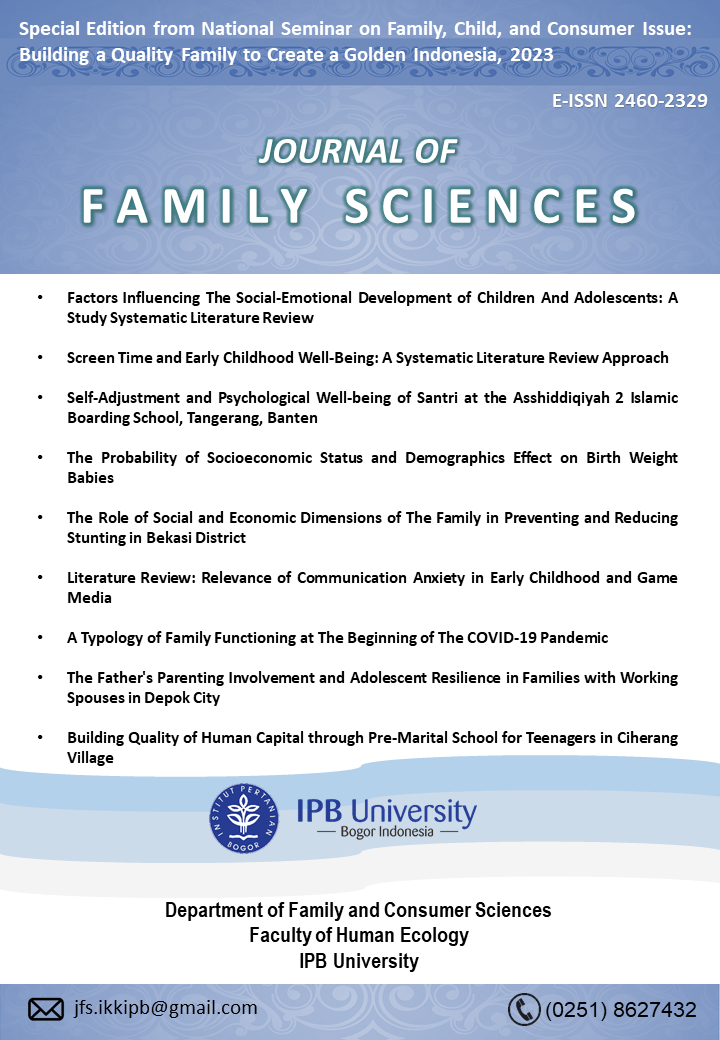Self-Adjustment and Psychological Well-being of Santri at the Asshiddiqiyah 2 Islamic Boarding School, Tangerang, Banten
Abstract
Adapting to a new situation is not easy thing to do, especially if the situation you face is very different from the previous situation. This study aimed to determine the relationship between self-adjustment and the psychological well-being of students at Asshiddiqiyah 2 Islamic Boarding School, Tangerang, Banten. Data were collected in May 2022, using a correlational approach. The population in this study was students aged 13-16 years with a total sample of 130 male and female respondents. The sample in this study was determined using proportional stratified random sampling with data collection techniques using a questionnaire (questionnaire) adjustment and psychological well-being. Spearman's rank correlation coefficient was used to test the data hypothesis. The results of the analysis show that the correlation coefficient between self-adjustment and psychological well-being is 0.989, with t count 7.078 > t table 1.960. It can be concluded that there is a significant relationship between self-adjustment and the psychological well-being of students at Asshiddiqiyah 2 Islamic Boarding School, Tangerang Banten. The theoretical implication of this study is that self-adjustment and psychological well-being have a positive relationship. Based on the analysis results, the relationship between self-adjustment and psychological well-being was strong and significant.
Downloads
References
Ali, M., & Asrori, M. (2011). Adolescent Psychology Student Development. Jakarta(ID): PT. Bumi Aksara.
Amawidyati, S. A. G., & Utami, M. S. (2007). Religiusitas dan psychological well‐being pada korban gempa. Jurnal Psikologi, 34(2), 164-176. https://doi.org/10.22146/jpsi.7095
Arikunto, S. (2010). Metode Peneltian. Jakarta(ID): Rineka Cipta.
Handono, O., & Bashori, K. (2013). Hubungan antara penyesuaian diri dan dukungan sosial terhadap stres lingkungan pada santri baru. EMPHATY: Jurnal Fakultas Psikologi, 1(2), 79-89. http://dx.doi.org/10.12928/empathy.v1i2.3005
Kumalasari, F., & Ahyani, L. N. (2012). Hubungan antara dukungan sosial dengan penyesuaian diri remaja di panti asuhan. Jurnal Psikologi: PITUTUR, 1(1), 21-31
Lisnawati, & Al Rahmah. (2018). Kesejahteraan psikologis ditinjau dari spiritualitas siswa di lembaga pendidikan berbasis agama pesantren dan non pesantren. Jurnal Psikologi Integratif, 6(1), 190-212. https://doi.org/10.14421/jpsi.v6i2.1499
Prabowo, A. (2016). Kesejahteraan psikologis remaja di sekolah. Jurnal Ilmiah Psikologi Terapan, 4(2), 246–260. https://doi.org/10.22219/jipt.v4i2.3527
Pritaningrum, M., & Hendriani, W. (2013). Penyesuaian diri remaja yang tinggal di pondok Pesantren Modern Nurul Izzah Gresik pada tahun pertama. Jurnal Psikologi Kepribadian dan Sosial, 2(3), 134-143.
Putri, P. N. A., & Rustika, I. M. (2017). Peran pola asuh autoritatif, efikasi diri, dan perilaku prososial terhadap kesejahteraan psikologis pada remaja akhir di Program Studi Pendidikan Dokter Gigi Fakultas Kedokteran Universitas Udayana. Jurnal Psikologi Udayana, 4(1), 151-164. https://doi.org/10.24843/JPU.2017.v04.i01.p16
Ramadhan, Y. A. (2012). Kesejahteraan psikologis pada remaja santri penghafal Al-quran. Psikologika: Jurnal Pemikiran dan Penelitian Psikologi, 17(1), 19-32. https://doi.org/10.20885/psikologika.vol17.iss1.art3
Ryff, C. D. (2013). Psychological well-being revisited: Advances in the science and practice of eudaimonia. Psychotherapy and psychosomatics, 83(1), 10-28. https://doi.org/10.1159/000353263
Ryff, C. D., & Singer, B. H. (2008). Know thyself and become what you are: A eudaimonic approach to psychological well-being. Journal of Happiness Studies, 9, 13-39. https://doi.org/10.1007/s10902-006-9019-0
Ryff, C. D., & Keyes, C. L. M. (1995). The structure of psychological well-being revisited. Journal of personality and social psychology, 69(4), 719. https://psycnet.apa.org/doi/10.1037/0022-3514.69.4.719
Sugiyono, D. (2013). Metode penelitian pendidikan pendekatan kuantitatif, kualitatif dan R&D. Bandung(ID): Alphabet
Widiastono, T. D. (2001). Sekolah berasrama, ketika jakarta tak lagi dirasa nyaman. Kompas. Edisi 1 Mei 2001.
Authors who publish with this journal agree to the following terms:
- Authors retain copyright and grant the journal right of first publication with the work simultaneously licensed under a Creative Commons Attribution 4.0 International License that allows others to share the work with an acknowledgement of the work's authorship and initial publication in this journal.
- Authors are able to enter into separate, additional contractual arrangements for the non-exclusive distribution of the journal's published version of the work (e.g., post it to an institutional repository or publish it in a book), with an acknowledgement of its initial publication in this journal.
- Authors are permitted and encouraged to post their work online (e.g., in institutional repositories or on their website) prior to and during the submission process, as it can lead to productive exchanges, as well as earlier and greater citation of published work (See The Effect of Open Access).



_001.png)



